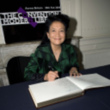Restless Empire: China and the World Since 1750
(Libby/OverDrive eBook, Kindle)
Available Platforms
Description
Similar Titles From NoveList
Similar Authors From NoveList
Published Reviews
Choice Review
Since 1750, China has experienced the heights of imperial power, subjugation by foreign imperialism, and a return to international prominence. Under the Manchus, the Qing dynasty was a vast multicultural empire that successfully coped with changing circumstances. But in the 19th century, internal crises left it vulnerable to external threats from other nations. In the last three decades, however, China has undergone a remarkable transition that has transformed it into the second-largest economy in the world behind the US. In this interpretive essay, Westad (international history, London School of Economics) explains the circumstances that led to the twists and turns in this long trajectory. His narrative skillfully draws upon insights derived from a large body of scholarship. But what lies ahead for China? The author feels that China's leadership must learn to accept pluralism with its minorities, tolerate religious beliefs, and curb corruption. They must also be able to check nationalism and formulate a global foreign policy beyond Asia. However, Westad is hopeful that China will prove to be resourceful and adaptive to these challenges. Overall, a stimulating read amenable to a wide audience. Summing Up: Highly recommended. All levels/libraries. F. Ng California State University, Fresno
Booklist Review
*Starred Review* With the largest national population and soon the largest national economy. China appears to most internal and external observers to stand on the precipice of world dominance. But as Bancroft Award winner Westad makes abundantly clear, China's eventual hegemony in the global marketplace may rely more on overcoming internal obstacles and on cooperating with its close neighbors thanany challenges presented by an American-led West. Building a superb story of China's historically schizophrenic relationship with the outside world, Westad reaches back to the long twilight of the Qing dynasty, canvassing the nation's conflicts with Western imperialists, expansionist neighbors, and internal minorities and revealing a country in which the past threatens to overwhelm the present. However, it is the Chinese foreign-policy developments of the twentieth century, including the republic under Chiang Kai-shek, triumph of Mao's Communists, and economic transformation under Deng Xiaoping, that form the bulk of this compelling, expansive account.Westad has provided readers with both a remarkable and timely glimpsebehind the curtain that is required reading for anyone interested in Chinese political history and economic development and the future of China's position in the international community.--Odom, Brian Copyright 2010 Booklist
Publisher's Weekly Review
Trauma, antagonism, and stimulating development are the fruit of China's deeply formative engagement with the world, according to this savvy history. Bancroft Prize-winning historian Westad (The Global Cold War), of the London School of Economics, surveys China's foreign relations from the 18th-century Qing dynasty's war in Burma to present-day wrangles over U.S. spy planes, mineral rights in the South China Sea, and the latter-day economic boom that has made nominally Communist China the "champion of free market capitalism." Much of this period is one of military subjection to rapacious foreign powers, but Westad emphasizes the importance of those experiences in making China modern: Western imperialism, he argues, brought economic development and new ideas about democracy and nationalism; Communist China's emulation of the Soviet Union boosted the power and activism of the state; China's post-cold war economic boom is predicated on international trade and investment, and business practices imported from abroad. Against the conventional image of an arrogantly aloof and immovable civilization, the author tells a story-apart from the disastrous xenophobic detour of Maoism-of China's progressive attunement and adaptation to foreign influences. Westad manages to compress a vast and complex history into a well-paced narrative that helps readers understand China's growing centrality in international affairs. 6 maps. Agent: Peter Robinson, Robinson Literary Agency. (Sept.) (c) Copyright PWxyz, LLC. All rights reserved.
Library Journal Review
During the past 250 years China has moved from the center of the world stage to abject isolation and back again, largely due to foreign pressures and influences. Westad (international history, London Sch. of Economics & Political Science; The Global Cold War) provides a nuanced interpretation of the history of China's foreign relations. Readers will find a thorough examination of how foreign encounters affected various segments of Chinese society and a description of intergovernmental exchanges. The book concludes with predictions of how China's foreign relations will unfold in the near future. VERDICT This is essential reading for students of modern Chinese history and for those interested in China's growing role in world affairs. Westad's ability to lucidly explain a complex subject makes this an excellent introduction. For a more comprehensive analysis of Chinese history covering roughly the same era, see Jonathan D. Spence's The Search for Modern China.-Joshua Wallace, South Texas Coll. Lib., McAllen (c) Copyright 2012. Library Journals LLC, a wholly owned subsidiary of Media Source, Inc. No redistribution permitted.
Kirkus Book Review
An astute, succinct study of modern China emphasizing overarching themes like hybrid identity and foreign influence rather than nationalism and centrality. In presenting this complex portrait of a fast-changing, multiethnic empire as it collided head-on with modern currents, Westad (International History/London School of Economics; The Global Cold War: Third World Interventions and the Making of Our Times, 2005, etc.) takes a thematic approach, following a dozen currents including the effects of imperialism and the relationship with Japan. The orientation of China's empire for millennia was toward the Yellow River and the east, with fluid borders, numerous tributary states and a sense of centrality dictated by Confucian ideals. Since 1636, the Qing, a conquering outsider tribe, consolidated rule by expanding outward, even by genocidal means. Qing rule would steadily be chipped away during the 19th century, due to subsequent ineffectual leadership and disastrous interventions in Burma and Vietnam, uneven growth while Europe began undergoing technological expansion, and a shifting trade with Russia and England. The aggressive arrogance demonstrated by Britain during the Opium War and the concessions wrung by the treaty underscored Qing impotence, emphasized Westerners' contempt for Chinese traditions, and sowed internal dissent. Westad employs this theme of foreign intervention all the way through Mao Zedong's stringent shutting off of China to the outside world. The author also examines the significance of the global Chinese migr community, which has played a key role in China's capitalist transformation since 1978. China's relationship with Japan grew mutually suspicious and fearful as Russia and the West moved in, and Japan's aggressive war with China, 1937-1945, wrought unimaginable destruction, as well as renewal and modernization. A fresh look at a confounding nation the West has not yet figured out.]] Copyright Kirkus Reviews, used with permission.
Booklist Reviews
*Starred Review* With the largest national population and soon the largest national economy. China appears to most internal and external observers to stand on the precipice of world dominance. But as Bancroft Award winner Westad makes abundantly clear, China's eventual hegemony in the global marketplace may rely more on overcoming internal obstacles and on cooperating with its close neighbors thanany challenges presented by an American-led West. Building a superb story of China's historically schizophrenic relationship with the outside world, Westad reaches back to the long twilight of the Qing dynasty, canvassing the nation's conflicts with Western imperialists, expansionist neighbors, and internal minorities and revealing a country in which the past threatens to overwhelm the present. However, it is the Chinese foreign-policy developments of the twentieth century, including the republic under Chiang Kai-shek, triumph of Mao's Communists, and economic transformation under Deng Xiaoping, that form the bulk of this compelling, expansive account.Westad has provided readers with both a remarkable and timely glimpsebehind the curtain that is required reading for anyone interested in Chinese political history and economic development and the future of China's position in the international community. Copyright 2012 Booklist Reviews.
Library Journal Reviews
During the past 250 years China has moved from the center of the world stage to abject isolation and back again, largely due to foreign pressures and influences. Westad (international history, London Sch. of Economics & Political Science; The Global Cold War) provides a nuanced interpretation of the history of China's foreign relations. Readers will find a thorough examination of how foreign encounters affected various segments of Chinese society and a description of intergovernmental exchanges. The book concludes with predictions of how China's foreign relations will unfold in the near future. VERDICT This is essential reading for students of modern Chinese history and for those interested in China's growing role in world affairs. Westad's ability to lucidly explain a complex subject makes this an excellent introduction. For a more comprehensive analysis of Chinese history covering roughly the same era, see Jonathan D. Spence's The Search for Modern China.—Joshua Wallace, South Texas Coll. Lib., McAllen (c) Copyright 2012. Library Journals LLC, a wholly owned subsidiary of Media Source, Inc. No redistribution permitted.
Publishers Weekly Reviews
Trauma, antagonism, and stimulating development are the fruit of China's deeply formative engagement with the world, according to this savvy history. Bancroft Prize–winning historian Westad (The Global Cold War), of the London School of Economics, surveys China's foreign relations from the 18th-century Qing dynasty's war in Burma to present-day wrangles over U.S. spy planes, mineral rights in the South China Sea, and the latter-day economic boom that has made nominally Communist China the "champion of free market capitalism." Much of this period is one of military subjection to rapacious foreign powers, but Westad emphasizes the importance of those experiences in making China modern: Western imperialism, he argues, brought economic development and new ideas about democracy and nationalism; Communist China's emulation of the Soviet Union boosted the power and activism of the state; China's post–cold war economic boom is predicated on international trade and investment, and business practices imported from abroad. Against the conventional image of an arrogantly aloof and immovable civilization, the author tells a story—apart from the disastrous xenophobic detour of Maoism—of China's progressive attunement and adaptation to foreign influences. Westad manages to compress a vast and complex history into a well-paced narrative that helps readers understand China's growing centrality in international affairs. 6 maps. Agent: Peter Robinson, Robinson Literary Agency. (Sept.)
[Page ]. Copyright 2012 PWxyz LLCReviews from GoodReads
Citations
Westad, O. A. (2012). Restless Empire: China and the World Since 1750 . Basic Books.
Chicago / Turabian - Author Date Citation, 17th Edition (style guide)Westad, Odd Arne. 2012. Restless Empire: China and the World Since 1750. Basic Books.
Chicago / Turabian - Humanities (Notes and Bibliography) Citation, 17th Edition (style guide)Westad, Odd Arne. Restless Empire: China and the World Since 1750 Basic Books, 2012.
Harvard Citation (style guide)Westad, O. A. (2012). Restless empire: china and the world since 1750. Basic Books.
MLA Citation, 9th Edition (style guide)Westad, Odd Arne. Restless Empire: China and the World Since 1750 Basic Books, 2012.
Copy Details
| Collection | Owned | Available | Number of Holds |
|---|---|---|---|
| Libby | 1 | 1 | 0 |






























